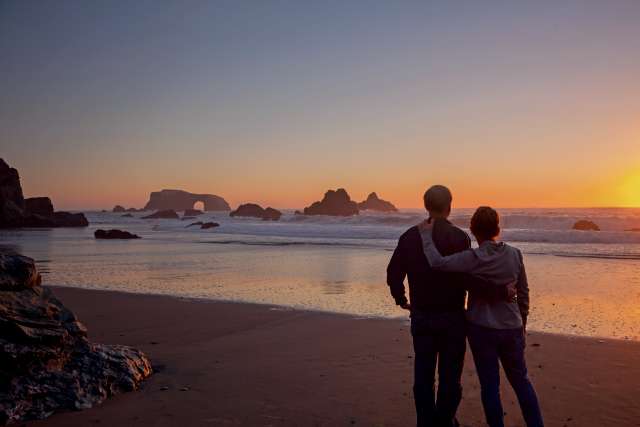As scientific understanding of the connection between extreme weather and climate change increases, the emotional, physical and financial impacts of climate change are also on the rise.
In the past few months, raging wildfires and intensifying hurricanes have devastated communities and uprooted thousands of lives. News of these disasters, often shared via mobile alerts and social media, are leaving many people with feelings of anxiety and hopelessness.
In Los Angeles County alone, rent increases and dropped home insurance policies have compounded the collective losses from the Eaton and Palisades wildfires. These conditions are contributing to overwhelming climate-related anxiety.
“Climate anxiety is a form of anxiety specific to climate change,” Dana Rose Garfin, PhD, associate professor-in-residence in the Department of Community Health Sciences at the Fielding School of Public Health at UCLA said. “It’s centered on concerns about environmental change and the associated long-term consequences.”
Dr. Garfin’s research focuses on the impacts of climate anxiety, exploring how collective trauma, such as from climate-related disasters, can affect people throughout their lifetime.
Who does climate anxiety impact?
Climate anxiety disproportionately affects certain socioeconomic groups and is influenced by social determinants of health, such as education, financial stability and health care access. A person’s age, personal experiences, and proximity to climate-related events can further amplify psychological distress.
The recent wildfires in Los Angeles are an example of how climate disasters can lead to widespread psychological distress.
"Several factors from the L.A. wildfires contributed to psychological distress,” Dr. Garfin said. “Many people were directly affected: they lost their homes, had to evacuate and were exposed to toxic air and smoke.”
Others who weren’t directly impacted also experienced distress, she noted, especially with excessive and repetitive exposure to devastating images in the media.
“We found that high levels of media exposure to crises are associated with symptoms of acute stress disorder,” Dr. Garfin said.
Dr. Garfin found that younger people report symptoms of climate anxiety more often than older adults. Data show this could be due to a heightened awareness of future climate challenges and a stronger sense of responsibility for addressing climate change.
What are the symptoms of climate anxiety?
Climate anxiety can resemble conditions like generalized anxiety disorder or post-traumatic stress disorder, Dr. Garfin said, including “elevated distress, anxiety, depression and even social and occupational impairment.”
Interestingly, some climate anxiety can also be associated with feelings of desire to drive change.
“When you think about anxiety on a continuum, some anxiety can be motivating and drive protective, productive behaviors,” Dr. Garfin said. “If we weren’t anxious at all, we wouldn’t get vaccinated for COVID-19, recycle or clean our homes.”
However, the mental health symptoms associated with climate-related disasters could also exacerbate an existing crisis, she pointed out. “If symptoms persist or begin to interfere with daily life, it’s important to seek professional mental health help."
How can we cope with climate anxiety?
There are a few ways to mitigate the symptoms of climate anxiety, Dr. Garfin said.
Limit social media exposure. Images of climate-related devastation may worsen an ongoing mental health crisis. While staying informed during disasters is vital, knowing when to limit your time spent on various media platforms is crucial for preventing symptoms of early PTSD.
“It’s important to stay informed, but there’s a big difference between reading about an update or even watching the news for 10 or 15 minutes and scrolling for hours,” Dr. Garfin said. “What we’ve found damaging is repeated exposure to these images.”
Try self-care. Getting enough sleep, eating healthy food, exercising, and prioritizing hobbies you enjoy can all help with climate anxiety and other social stressors.
Also, studies show spending time in nature can significantly improve mental health.
Seek opportunities for positive action. “Research shows that engaging in environmental activism and mitigation efforts can reduce feelings of anxiety,” Dr. Garfin said. “This approach has a dual benefit—making a difference in the world while serving as a coping mechanism.”
Start simple, she said. As a first step, do some research to find something that interests you, and get involved.
“It could mean planting a community garden, donating to a cause you care about, or making small changes like reducing your meat consumption or using public transportation more often.”
On a larger scale, working with a community group or organization that aligns with your beliefs and goals for change can foster a sense of empowerment and provide social support, Dr. Garfin says.
“This can give you a sense of control during a time when many things might feel out of your control.”



